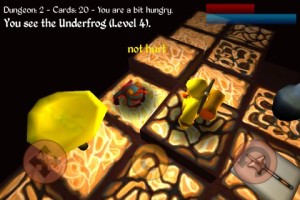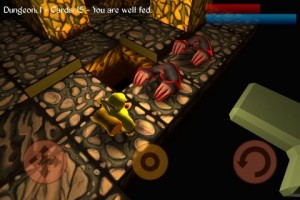 Sometimes You Have to Dig Deep
Sometimes You Have to Dig Deep
A lowly dwarvish miner named Krumb has apparently decided to play hookey forever, rushing into the depths of the earth in search of big-time loot. Whether he succeeds in finding it or dies trying, at least he’ll have escaped his status as a Pitman (Out Now for $1.99, Lite). Like Krumb, the player will have to dig in with patience before this game yields up all its charms, but fans of dungeon roving games – especialy those that cling to the standard conventions of roguelikes – will find a surprising amount to love here provided they’re willing to meet it halfway.
Short on story aside from an intro screen, Pitman ushers the player right into the business of guiding Krumb around his environment one isometric tile at a time. The central gameplay mechanic here is resource management: Krumb is hardly outfitted for the long treasure-finding quest he’s taken on, so he’ll have to survive on the random assortment of items and equipment the player finds scattered around, or perhaps dropped by one of the many unseemly creatures Krumb will slay along the way. However, Pitman‘s real claim to fame is sure to be the way in which it gives the player some control over how the game’s dungeons take shape. Each level consists of twenty or so randomly generated plots – termed “cards” for reasons that are still beyond me – and the player actively lays these down in front of Krumb when he reaches the border of an already established area. Merely an extra layer of randomness in ye olde random dungeon game design technique, perhaps, but I have to admit it’s pretty nifty to watch in action and helps keep the player’s experience fresh over the many times Krumb falls victim to the dangers of his world.
 Pitman‘s stats and equipment management systems will strike newcomers as much too bare-bones to provide a fun diversion at first, and they’ll quickly grow frustrated with Krumb’s limited inventory or seeming inability to tell what certain items do. These faults are but an illusion, one caused by Pitman‘s lack of a live tutorial. Those willing to sit down for some old-fashioned reading will find an entire instruction booklet’s worth of material in the game’s help menu, which reveals tons of interesting nuances: Krumb must be properly fed and watered with what morsels the player can find lest the dwarf starve to death; equipment breaks down with use in battle; and Krumb’s ability to carry items or read their fine print depends on how the player distributes Level Up points. Pitman brings little new to the table in terms of RPG game mechanics, but it does serve up the basics in an interesting way.
Pitman‘s stats and equipment management systems will strike newcomers as much too bare-bones to provide a fun diversion at first, and they’ll quickly grow frustrated with Krumb’s limited inventory or seeming inability to tell what certain items do. These faults are but an illusion, one caused by Pitman‘s lack of a live tutorial. Those willing to sit down for some old-fashioned reading will find an entire instruction booklet’s worth of material in the game’s help menu, which reveals tons of interesting nuances: Krumb must be properly fed and watered with what morsels the player can find lest the dwarf starve to death; equipment breaks down with use in battle; and Krumb’s ability to carry items or read their fine print depends on how the player distributes Level Up points. Pitman brings little new to the table in terms of RPG game mechanics, but it does serve up the basics in an interesting way.
I would raise three complaints with Pitman that its instruction booklet doesn’t solve. Since effective inventory management requires the player to dump worn-out equipment and lesser items as new ones pop up in Krumb’s path, it would be great to have a dungeon map or some other aid to the player’s memory in case he or she runs out of resources and feels the need to return for abandoned loot. Secondly, the ultra-basic combat system meshes seamlessly with exploration in a way that limits how fast Krumb can get around. All movement on Pitman’s boardgame-like environments is capped at two tiles, so if the player wants an item that’s far away from Krumb he or she must tap on the desired destination several times before the character successfully covers the distance. Finally, an auto-save feature to complement manual saves would be wonderful!
 Otherwise Pitman feels well built, benefiting from its limited interface and touch-friendliness. The environments Krumb finds himself in are presented at such an angle that individual tiles are easy for the player’s finger to pick out, and the field may be shifted or rotated by way of virtual joysticks to reveal level layout and enemy positions.
Otherwise Pitman feels well built, benefiting from its limited interface and touch-friendliness. The environments Krumb finds himself in are presented at such an angle that individual tiles are easy for the player’s finger to pick out, and the field may be shifted or rotated by way of virtual joysticks to reveal level layout and enemy positions.
Where Pitman trips up most is its visual presentation. No doubt there are tons of calculations taking place under the hood as player and enemy models hop around like static chess pieces, but most players will find Pitman one dimension removed from the earliest ASCII roguelikes — and perhaps this is by design inasmuch as the game feels like a loving tribute to a bygone era. The player-controlled dungeon generation process does spice things up visually as plots of land uncannily fly in. Rat King Entertainment also compensated on the audio side by selecting rich sound samples and contracting with Kevin MacLeod (of Arno the Hunter fame!) to provide a few music tracks that shine with authentic dwarvish personality.
iFanzine Verdict: If you long for a title that tries to reach out and grab you with innovative gameplay twists, dazzling visuals or a great story, you can safely pass this one up. However, fans of dungeon crawlers – and especially those for whom the term “roguelike” invokes warm memories – would do well to dig into Pitman. Genre fans should find it solidly built and complex enough to furnish numerous hours’ worth of resource management fun!
[xrr rating=3.5/5]


